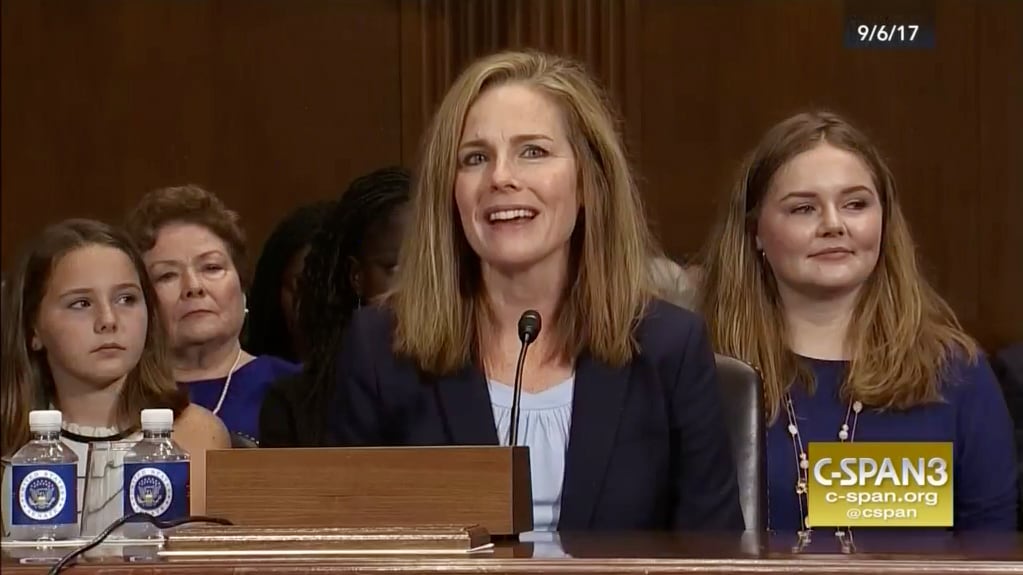Anti-Catholic bigotry has no place in the Barrett confirmation hearings

Some media outlets and some Democrats, including some members of Congress, began focusing on Barrett’s Catholicism when she was rumored to be the president’s choice in the past week. Perhaps most concerning was the grilling about her religious views by Senate Judiciary Committee members Dianne Feinstein (D-Calif.) and Dick Durbin (D-Ill.), who is himself Catholic, during Barrett’s 2017 confirmation hearings for the Circuit Court, and the reply this week by their committee colleague Sen. Mazie Hirono (D-Hawaii), when she said “no” when asked if questions about Barrett’s religious views would be off the table.
In the 2017 hearing, for instance, Feinstein said to Barrett, “When you read your speeches, the conclusion one draws is that the dogma lives loudly within you. And that’s of concern when you come to big issues that large numbers of people have fought for years in this country.”
This open attack on Barrett’s beliefs was roundly and rightly condemned. It should not be repeated. But insinuations that Catholics take their cues from Rome and not from the U.S. Constitution are deeply embedded anti-Catholic smears that still emerge when useful.
If Senate Democrats in Barrett’s confirmation hearings, or in talking to the press, again focus on the nominee’s religion, the scurrilous tactic will almost certainly be met with disgust by voters. Democrats up and down the ticket will not be protected from severe blowback just because they have previously nominated Catholics, Joe Biden among them, for the presidency. Today’s voters, Catholics in particular, will recognize any focus on faith in this judicial context for what it is: anti-Catholic bigotry.
“Originalist” conservatives would not object to a serious review of Barrett’s rulings and indeed will welcome such a discussion. They have for nearly three decades — since the 1992 abortion decision in Planned Parenthood v. Casey — felt betrayed, and even lied to, by justices they thought had been nominated to bring principled constitutionalism back to the court. It isn’t liberal justices who outrage conservatives, but rather the Republican nominees who “evolved” on what is the court’s job and what belongs to legislatures.
Trust in nominees has been breached too often for conservatives to sit down and shut up when nominees with distinguished records and a known judicial outlook are attacked. Barrett appears to be a superb scholar and excellent judge. She may also in the future occasionally disappoint. But her faith won’t be the reason, and it should not be part of the discussion of her qualifications.
Barrett may prove a pivotal voice in a multitude of cases, including separation-of-powers controversies, the reach of administrative agencies and the erosion of property rights. Many center-right Americans also want the court to reconsider its abortion decisions — not on religious grounds but because with Roe v. Wade and its successor, Planned Parenthood v. Casey, the court invented a jurisprudence that has never persuaded. In doing so, the court stripped states of the right to enact laws that reflect their citizens’ views on the difficult balancing of reproductive privacy against when to protect unborn children.
Chief Justice John G. Roberts Jr. wrote eloquently in his concurring opinion in the 2010 Citizens United decision on campaign finance that when “considering whether to reexamine a prior erroneous holding, we must balance the importance of having constitutional questions decided against the importance of having them decided right.”
Conservatives would like to see future abortion cases “decided right,” but there are many other decisions that have gone off the Constitution’s rails in less visible ways and need another look. And the court has a history of correcting its most terrible decisions, from the 1857 Dred Scott decision, which helped bring on the Civil War with its despicable protection of slavery, to the Korematsu case allowing the internment of Japanese American citizens during World War II. Bad decisions must be reversed.
I and many other Catholics worry that a Supreme Court with a strong, long-term presence of self-identifying Catholics (there are currently five) could create the mistaken impression that the court’s decisions are driven more by theological concerns than legal ones. But that worry does not license the exercise of anti-Catholic bigotry against a particular nominee.
What matters regarding a nominee’s faith, or lack of it, is Article VI of the Constitution, which provides in its relevant part that “no religious Test shall ever be required as a Qualification to any Office or public Trust under the United States.” That is an absolute prohibition, and any senator who violates it in the coming weeks should be ashamed — and shamed. Either we are for or against the Constitution. To ignore this strict prohibition is to be against it.
Read more:






